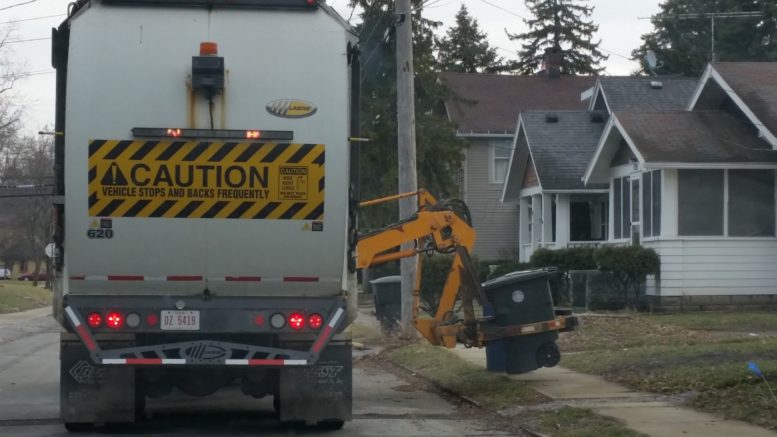By JAN LARSON McLAUGHLIN
BG Independent News
Thanks to state funding cuts, Bowling Green residents will start paying for their trash pickup next year.
City Council decided Monday evening to make up for state hits to the city’s general fund by charging a fee for trash pickup. The fee, which will go into effect in 2018, will average $12 to $13 a month for customers.
The decision came after months of discussion of how Bowling Green could make up for a shortfall in the city’s general fund revenue. Five options that could bring in $800,000 a year remained on the table Monday evening:
- Redistribution of the city income tax – which would have to appear on the November ballot.
- Start charging for trash collection.
- Combination of assessing for tree trimming and redistributing income tax.
- Combination of tree trimming and garbage fees.
- Combination of trash fees and income tax redistribution.
In the end, the garbage fee won out – but council warned that the city income tax revenue distribution was not a sacred cow, and may be the next victim when future funding shortfalls occur.
Most communities in the region already charge for trash pickup. However, this option was the most expensive to the homeowners, since it has the narrowest base of payers. Apartment residents, most condominium owners, plus commercial and industrial sites would be excluded since they already pay for trash pickup from private contractors.
“We’re selecting the homeowners to fix this,” council member Scott Seeliger said. In contrast, the income tax redistribution would be felt most by industrial and commercial customers.

Council members Bob McOmber and Mike Aspacher talk before meeting begins.
But council president Mike Aspacher said he supported the trash fee as the best of the bad options available. “It gives us the best opportunity to begin in fill the hole in our general fund revenue,” he said.
Two council members were swayed by information presented by citizen Neocles Leontis, who suggested that Bowling Green could save on its landfill bill by encouraging more recycling and composting. Of the 5,600 tons picked up a year by the city, 12 percent is recycled. That compares with a national average of 35 percent, Leontis said.
Daniel Gordon said better trash policies could be a “brilliant” solution that could be a “win-win.”
John Zanfardino said he was initially worried about the trash fee impacting homeowners the most, but the option would pay off if the city can charge people a lower rate for generating less garbage.
Mayor Dick Edwards spoke out strongly against one of the options not chosen – redistribution of the city’s income tax revenue. The formula for the income tax division gives a large chunk (one-third) to the utilities department for its water and sewer capital improvement fund.
Edwards spoke of the history behind that decision and how the city had benefitted by devoting so much to its water and sewer fund.
“We need to think very carefully” about any redistribution, he said, voicing “major reservations about turning back the clock” on the public utilities program.
The healthy funding has created water and sewer programs with low rates, quality water, and the ability to attract economic development – which in turn generates more income tax revenue for the city, said the mayor and Aspacher. The program has also helped the city move ahead with wind and solar energy endeavors.
Edwards pointed out the strong contrast to nearby cities like Toledo and Fostoria that are struggling due to inadequate funding for services. “We don’t have to look too far away,” to find reasons to keep the funding, he said.
“These are tough decisions. There are no simple, easy answers,” the mayor said.
Bob McOmber, head of council’s finance committee, said the mayor’s statement convinced him to not touch the income tax revenue going to the water and sewer fund.
“The mayor’s opinion sways me,” McOmber said. “If the mayor is opposed to it, I don’t think it passes at the ballot box in November.”
Council members Bruce Jeffers and Sandy Rowland agreed, but also wanted to discuss how discussions could take place in case that option needs to be considered during the next funding shortfall, which tends to happen about every eight years.
The last three shortfalls were resolved by the city raising its income tax. But now the income tax sits at 2 percent, and most council members were reluctant to hike it over that level.
Council members also discussed the possible impact of each of the options on the Bowling Green City School bond issue set to appear on the November ballot. Zanfardino said both the tree trimming assessment and the new garbage fee could make voters feel less generous at the polls.
But Rowland pointed out that the income tax redistribution could have the same effect. Even though it does not raise any taxes, voters may be confused by the issue and misinterpret it as an increase.
Gordon said an educational process will be necessary to explain to voters the reason for the trash fee.
“The vast majority of people I talk to on the street have no idea what we are talking about,” he said. And many of them blame the general fund shortfall on local misuse of funds even though council has been talking about the harm from state funding cuts for years.
Prior to council’s discussion of the funding options, citizens were asked to share input. Joan Callecod suggested that the trash fee be made part of the real estate bills, which would allow people to itemize and save a little.
Bob Pruger said the trash fee was his preference. But he also recommended that the city use State Treasurer Josh Mandel’s public checkbook program, which makes public spending very visible to the community.
“It would put a lot more eyes on where we spend our money,” Pruger said.
Bowling Green Financial Director Brian Bushong said the city has been working on joining the public checkbook program for months, and is near completion.

